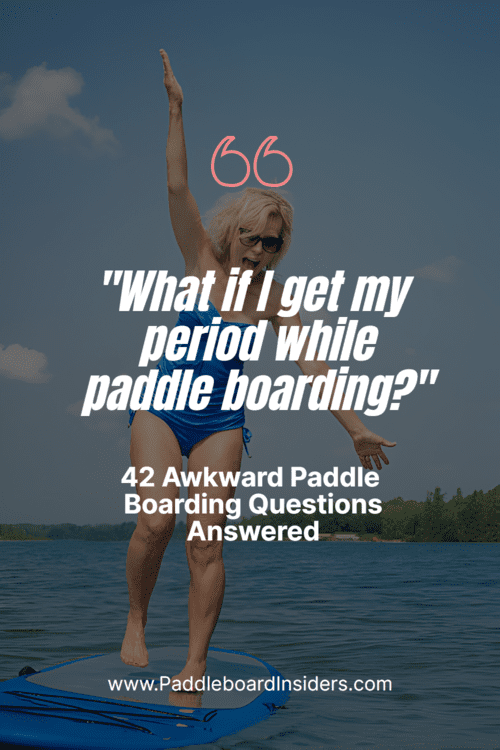42 Awkward & Embarrassing Questions About Paddle Boarding Answered
*We may earn a commission for purchases made using our links. Please see our disclosure to learn more.
Getting on a paddle board is a fun and increasingly popular water sport, but it’s natural to have questions, especially if you’re new to it.
That’s why we prowled through the internet to find some of the most awkward & embarrassing questions that people have about the sport, and are too afraid to ask.
Let’s get into them.
| Looking for our best paddle board product recommendations? Check the Paddleboard Insiders Buyer Guides |
Table Of Contents
- #1: What is the point of paddle boarding?
- #2: Am I too fat to paddle board?
- #3: What if I fall in the water?
- #4: What is the difference between SUP and paddle boarding?
- #5: Will I lose weight paddle boarding?
- #6: Is it OK to sit on a paddle board?
- #7: Can 2 adults go on a paddle board?
- #8: How far can a person paddle in a day?
- #9: Do you stand in the middle of a paddle board?
- #10: How do you not fall when paddle boarding?
- #11: Am I too old to start paddle boarding?
- #12: What if I fall in front of others?
- #13: What if I can’t keep up with more experienced paddlers?
- #14: Do I need to wear a swimsuit, or what if I don’t want to wear one?
- #15: Is it normal to feel scared of open water or deep water?
- #16: Can I paddle board alone, or do I always need a buddy?
- #17: Are there specific rules of etiquette I should be aware of?
- #18: What if I don’t have the balance for paddle boarding?
- #19: Is it embarrassing to use a very wide or stable board?
- #20: Can paddle boarding exacerbate existing injuries?
- #21: What happens if I need to go to the bathroom while out on the water?
- #22: Will paddle boarding make me chafe?
- #23: What if I get my period while paddle boarding?
- #24: Do I have to take my shirt off to paddle board?
- #25: Can paddle boarding cause urinary tract infections (UTIs)?
- #26: Is it okay to paddle board if I’m afraid of fish or seaweed?
- #27: What if I get motion sickness while paddle boarding?
- #28: How do I handle encounters with aggressive wildlife, like snakes or alligators, while paddle boarding?
- #29: Can paddle boarding in cold water cause issues like hypothermia?
- #30: Will I get tan lines or sunburn in awkward places from paddle boarding?
- #31: What if I’m afraid of drowning, even with a life jacket?
- #32: Is it awkward to paddle board during a date or with someone I’m interested in?
- #33: What if I accidentally invade someone’s privacy or space while paddle boarding?
- #34: What do I do if I accidentally pee myself out of fear or excitement while on the board?
- #35: Will I attract sharks or dangerous marine life while paddle boarding?
- #36: How do I avoid awkward tan or sunburn patterns from my PFD or clothing?
- #37: What should I do if I feel anxious or panicky in the middle of the water?
- #38: Is it rude to ask someone to stop splashing or making waves near me?
- #39: What if I get an awkward itch or need to adjust my swimsuit in a revealing way while on the board?
- #40: Is it common to feel embarrassed about using a beginner board when others have advanced equipment?
- #41: How do I handle getting water in my ears that won’t come out, especially if it causes discomfort or affects my balance?
- #42: Is it embarrassing to ask for help in front of others if I can’t get back on my paddle board after falling off
- Paddle Board Questions – Conclusion:
#1: What is the point of paddle boarding?
Paddle boarding is a versatile activity that offers a mix of adventure, relaxation, and exercise. It allows you to explore waterways, enjoy the tranquility of being on the water, improve your balance and fitness, and can be a meditative activity that connects you with nature.
| Here are the muscles that you work on a paddle board: The Muscles Used In A Paddle Boarding Stroke: Detailed A-Z Guide |
#2: Am I too fat to paddle board?
Absolutely not. Paddle boards are designed to accommodate a wide range of body weights and sizes. The key is to choose a board with the right volume and stability for your weight. Many boards are specifically designed for larger paddlers, so look for one that supports your weight comfortably.
| Here’s how paddle board weight limits work: How Do Weight Limits On A Paddleboard Work? Detailed A-Z Guide |
#3: What if I fall in the water?
Falling in is part of the learning process and nothing to worry about! Make sure you’re wearing a life jacket or PFD, especially if you’re not a strong swimmer. When you fall, try to fall away from the board to avoid injury. To get back on, swim to the side of your board, grab it, and pull yourself up while kicking your legs.
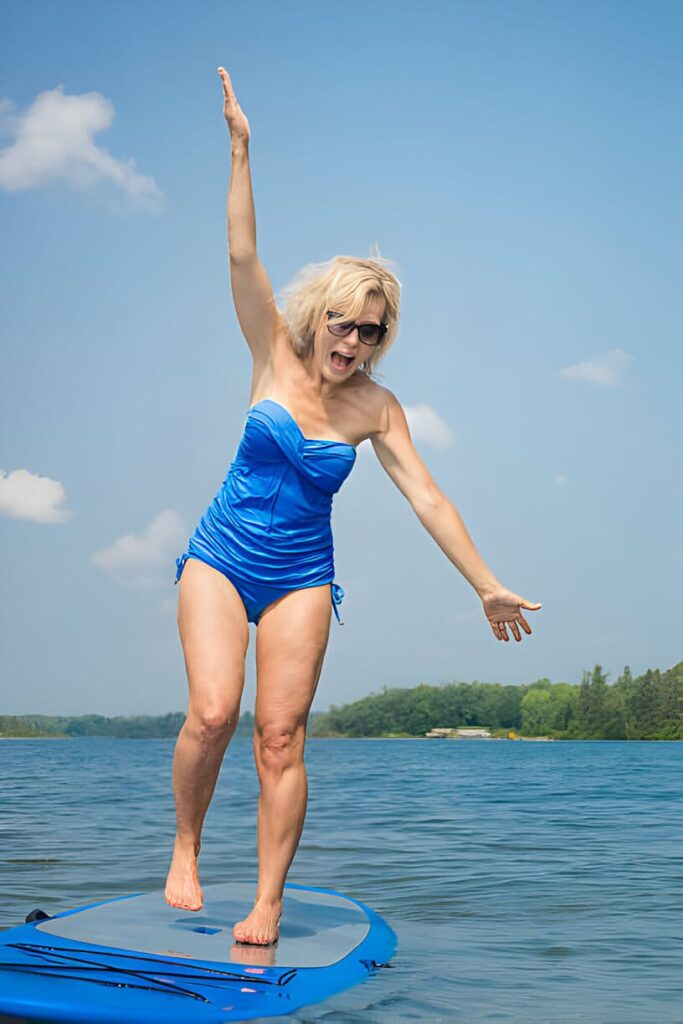
| Here’s a detailed guide on how to stand: How To Stand On A Paddleboard: The Definitive Guide |
#4: What is the difference between SUP and paddle boarding?
SUP stands for Stand-Up Paddleboarding, which is a subset of paddle boarding. While all SUP involves standing up and paddling on a board, paddle boarding can also include variations where you might kneel or sit down. So, SUP is specifically standing up and paddling.
#5: Will I lose weight paddle boarding?
Yes, you can. Paddle boarding is an effective full-body workout that burns calories, especially if you go at a brisk pace or navigate through waves and currents. Combined with a healthy diet, it can definitely help with weight loss.
| Here’s how to calculate how many calories you burn on a SUP: A Simple Formula To Calculate How Many Calories You Burn Paddle Boarding |
#6: Is it OK to sit on a paddle board?
Yes, it’s perfectly fine to sit on your paddle board. Some people prefer sitting or kneeling, especially when starting out, if they’re feeling tired, or if they’re using their board for fishing or yoga. Many boards are designed to be versatile enough to accommodate sitting and standing.
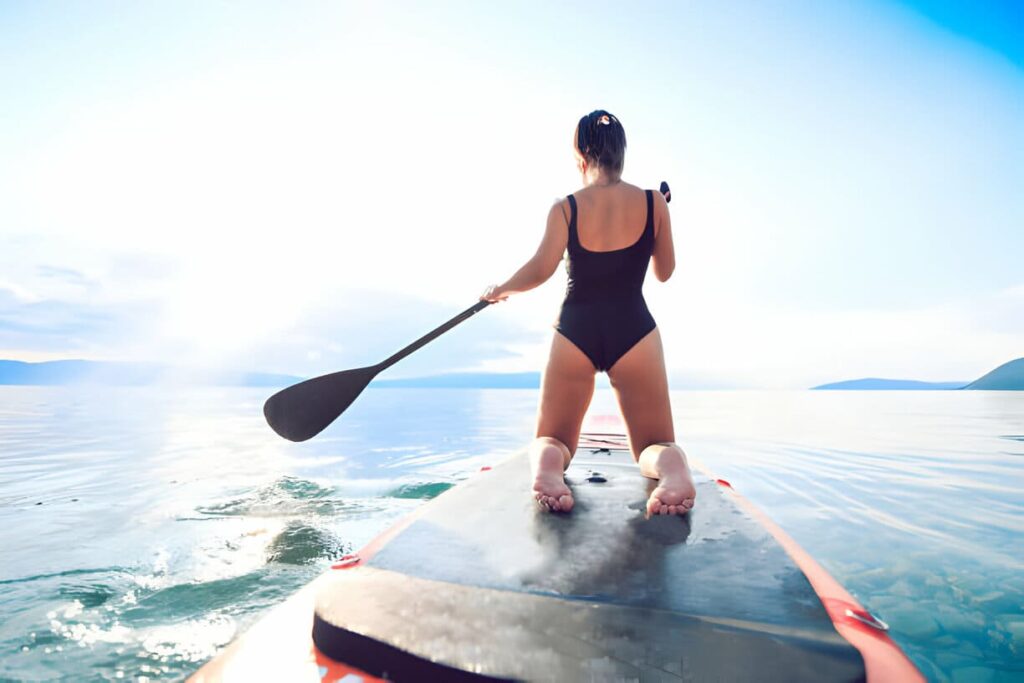
#7: Can 2 adults go on a paddle board?
Yes, two adults can go on a paddle board designed for multiple riders. These boards are larger and more buoyant to support the extra weight. It’s a fun way to paddle with a partner, but make sure the total weight doesn’t exceed the board’s recommended limit.
#8: How far can a person paddle in a day?
The distance someone can paddle in a day depends on several factors, including fitness level, conditions, and the type of paddle boarding you’re doing. On average, a recreational paddler can cover between 1 to 5 miles without significant effort. More experienced or competitive paddlers might cover 10 to 20 miles or more in a day.
#9: Do you stand in the middle of a paddle board?
Yes, standing in the middle of the board, where it’s widest, offers the most stability. Your feet should be parallel, about shoulder-width apart, and centered between the edges of the board. This position helps you maintain balance and control.
#10: How do you not fall when paddle boarding?
To avoid falling, focus on your stance (feet parallel and shoulder-width apart), keep your knees slightly bent to absorb movement, look at the horizon instead of down at your feet, and use your core muscles to paddle rather than just your arms. Practice makes perfect, and over time you’ll improve your balance and technique.
#11: Am I too old to start paddle boarding?
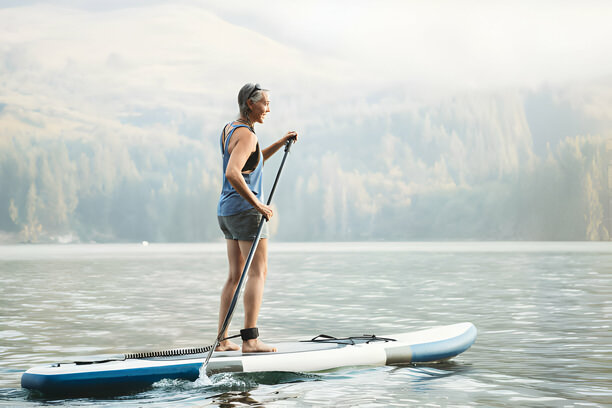
Absolutely not. Paddle boarding is accessible to people of all ages, and many find it to be a rewarding and enjoyable way to stay active. It’s low-impact, which makes it suitable for seniors or those looking for a gentle but effective form of exercise. The key is to start at your own pace and choose conditions and equipment that make you feel comfortable and safe.
#12: What if I fall in front of others?
Falling off your paddle board is part of the learning process and happens to everyone, even the most experienced paddlers. Most people find it funny and part of the fun. Remember, every paddler has been there, and it’s unlikely that others will judge you for it. Instead, they might offer tips or help based on their own experiences.
#13: What if I can’t keep up with more experienced paddlers?
Paddle boarding is more about enjoying the journey than racing to the finish. If you’re paddling with a group and worry about keeping up, communicate your concerns with them. Most paddling communities or groups are supportive and will adjust the pace so everyone can enjoy the outing. Alternatively, seek out beginner-friendly groups or events tailored to your skill level.
#14: Do I need to wear a swimsuit, or what if I don’t want to wear one?
You don’t have to wear a swimsuit if you’re not comfortable doing so. Many paddlers wear quick-dry sports clothes, rash guards, leggings, or shorts designed for water sports. The key is to wear something that you’re comfortable in and that won’t restrict your movement or become too heavy when wet.
| Here is exactly what you should wear when paddle boarding: Essential Paddleboarding Clothes You Need For All Weather Conditions |
#15: Is it normal to feel scared of open water or deep water?
Yes, it’s perfectly normal. Many people share this fear when they first start out. As you spend more time on your board and gain confidence in your abilities, these fears often diminish. Starting in shallow, calm waters and gradually working your way up to more open areas can help you become more comfortable.
#16: Can I paddle board alone, or do I always need a buddy?
While paddle boarding can be safely enjoyed alone, especially as you become more experienced, it’s generally recommended to paddle with a buddy, particularly in challenging conditions or remote locations. If you do go out alone, make sure to tell someone where you’re going and when you expect to return, and always bring a means of communication.
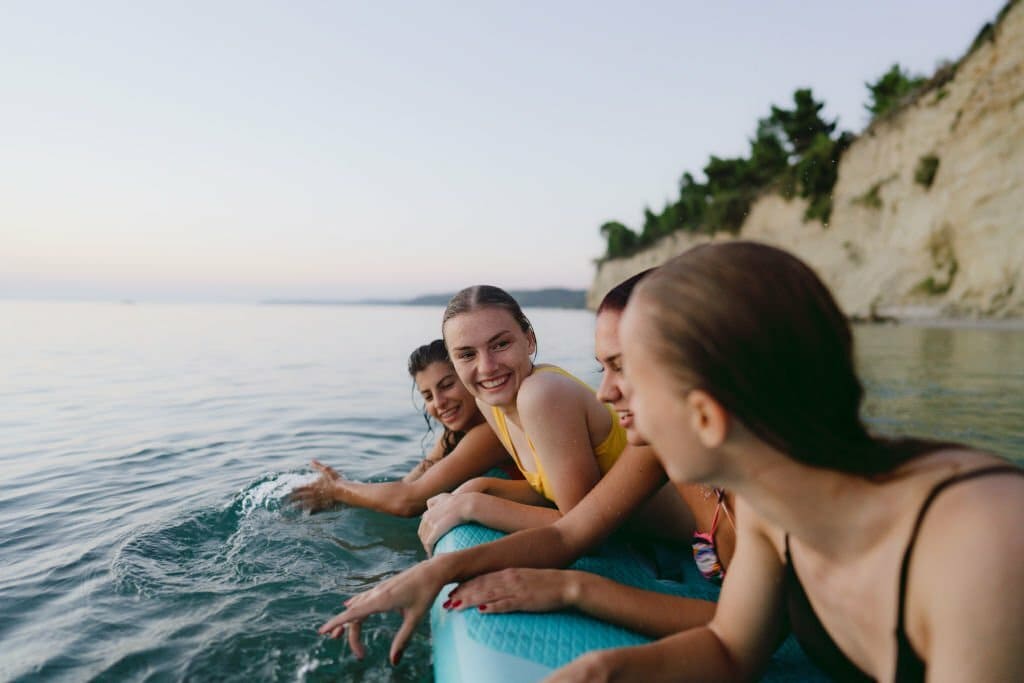
#17: Are there specific rules of etiquette I should be aware of?
Yes, there are some general rules of etiquette to ensure safety and enjoyment for everyone on the water. These include staying clear of swimmers and other water users, not crowding other paddlers, being mindful of wildlife, and adhering to local regulations and navigational rules. Always practice “leave no trace” principles by taking your trash with you.
#18: What if I don’t have the balance for paddle boarding?
Balance improves with practice, and starting with a wider, more stable board can help you gain confidence. Many beginners are surprised by how quickly they adapt. There are also specific exercises you can do off the board to improve your balance and core strength, making it easier when you’re on the water.
| Use this guide if you have bad balance: Is Paddleboarding Hard? Not If You Follow This… |
#19: Is it embarrassing to use a very wide or stable board?
Not at all. In fact, using a board that offers more stability is smart, especially when you’re learning. It allows you to focus on your technique and enjoy the experience without constantly worrying about falling in. As you progress, you can always transition to a board that matches your evolving skills.
| Here are the best paddle boards for beginners: 9 Best Inflatable Paddle Boards For Beginners In 2024 |
#20: Can paddle boarding exacerbate existing injuries?
Like any physical activity, paddle boarding can put strain on certain parts of your body, particularly your shoulders, back, and core. If you have pre-existing injuries, it’s best to consult with a healthcare professional before starting. Proper technique and choosing the right equipment can also help minimize the risk of aggravating injuries. Many find paddle boarding to be a beneficial form of exercise for rehabilitation, thanks to its low-impact nature.
#21: What happens if I need to go to the bathroom while out on the water?
This is a practical concern, especially for longer paddling sessions. Planning ahead is key, such as using the restroom before heading out. For emergencies, it’s wise to know how to discreetly use a portable urinal device or plan routes where there are accessible restrooms along the way.
#22: Will paddle boarding make me chafe?
Chafing can be a concern, especially in saltwater or when wearing wet clothes for extended periods. It’s a valid question for ensuring comfort during and after paddling. Wearing appropriate clothing, such as rash guards and proper water-resistant, quick-dry materials, and using chafing cream or gel in sensitive areas can help prevent this issue.
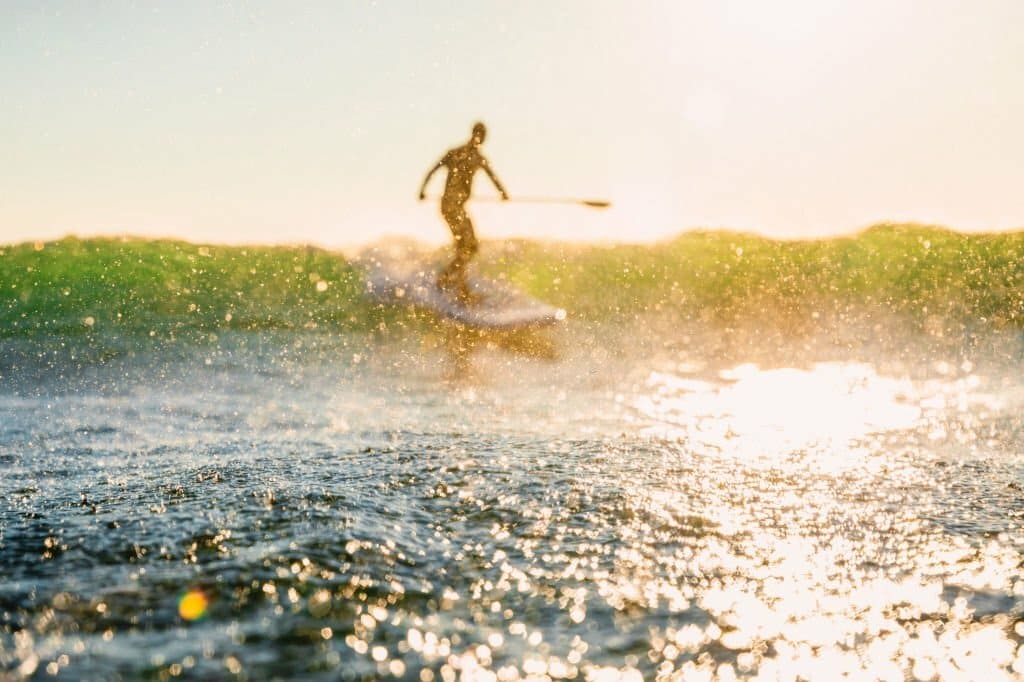
#23: What if I get my period while paddle boarding?
For many women, this is a significant concern that can impact their decision to engage in water sports. Using tampons, menstrual cups, or period-proof swimwear are options that allow many women to paddle board comfortably during their period. It’s also helpful to carry a waterproof bag for storing used items if necessary.
#24: Do I have to take my shirt off to paddle board?
Some people might feel self-conscious about their body and worry about the expectation to paddle board with minimal clothing. The answer is no; you should wear whatever makes you comfortable and safe in the water, including UV-protective shirts or rash guards that can also help prevent sunburn.
| Here’s a guide on clothes: What To Wear Paddle Boarding: A Complete Guide For Any Weather |
#25: Can paddle boarding cause urinary tract infections (UTIs)?
While not a common concern, sitting in a wet swimsuit for prolonged periods can increase the risk of UTIs for some individuals. This question highlights the importance of personal hygiene and health. Changing into dry clothes promptly after paddling and maintaining hygiene can help mitigate this risk.
#26: Is it okay to paddle board if I’m afraid of fish or seaweed?
Fear of marine life or the feeling of seaweed brushing against your legs can be unsettling for some. It’s okay to have these fears, and acknowledging them is the first step toward addressing them. Starting in clear, calm waters where you can see the bottom and gradually exposing yourself to different environments can help alleviate these fears over time.
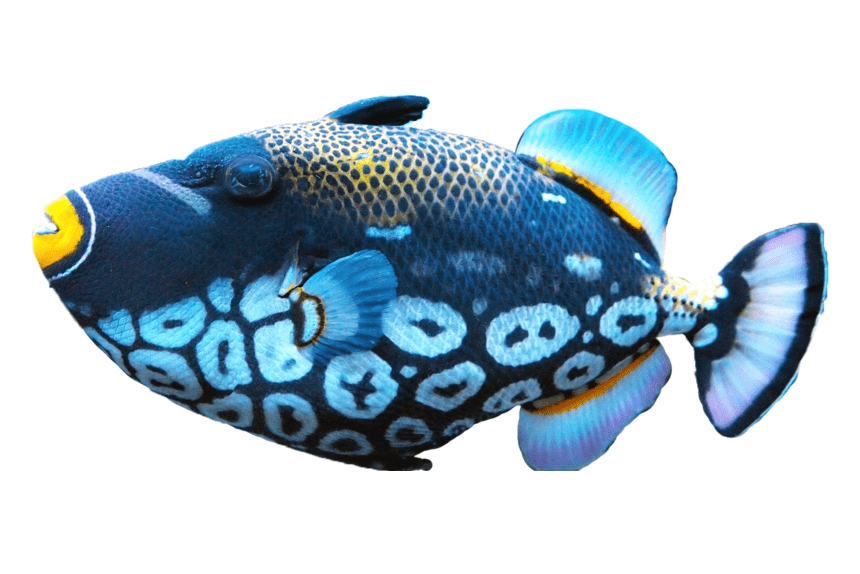
#27: What if I get motion sickness while paddle boarding?
Motion sickness can happen, especially in choppy water or if focusing too intently on the board instead of the horizon. Asking about preventative measures, like motion sickness bands or medication, and strategies for what to do if you start feeling queasy, is smart for those susceptible.
#28: How do I handle encounters with aggressive wildlife, like snakes or alligators, while paddle boarding?
Though rare, the possibility of encountering wildlife that could be perceived as threatening can be a concern. Understanding how to safely observe wildlife from a distance and knowing the specific behaviors to adopt if you encounter aggressive animals are important safety measures.
#29: Can paddle boarding in cold water cause issues like hypothermia?
Paddling in cold water does bring risks, such as hypothermia, if you’re not properly dressed or if you fall into the water. It’s wise to ask about the right gear, such as wetsuits or drysuits, and the signs of hypothermia to watch for when paddling in cooler conditions.
#30: Will I get tan lines or sunburn in awkward places from paddle boarding?
Given the exposure to the sun while on the water, concerns about sunburn and tan lines, especially in areas not typically exposed, are valid. Inquiring about the best types of sunscreen, clothing, and strategies for sun protection to avoid uneven tan lines or burns is beneficial.
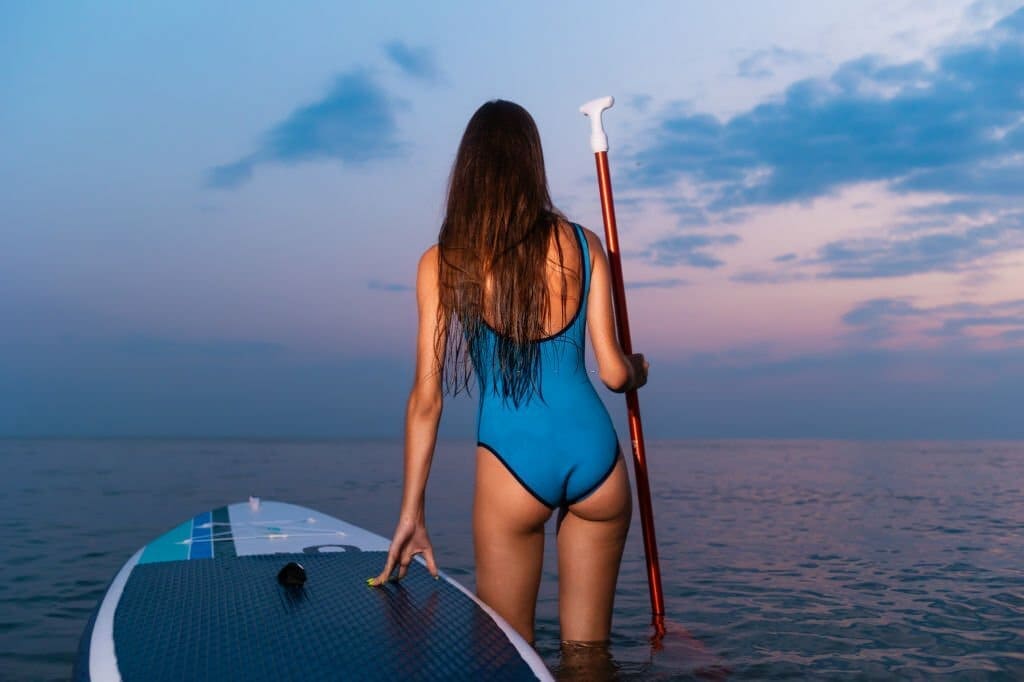
#31: What if I’m afraid of drowning, even with a life jacket?
The fear of drowning is a significant barrier for some, even with safety gear. Discussing these fears, understanding how personal flotation devices (PFDs) protect you, and learning about additional safety measures can help alleviate anxiety related to being on the water.
| Here are some great life jacket examples: The 8 Best Paddleboarding Life Jackets Of 2024 |
#32: Is it awkward to paddle board during a date or with someone I’m interested in?
Worries about looking clumsy or inexperienced in front of a date or crush are common. Asking for tips on making the experience fun and engaging, regardless of skill level, can help turn paddle boarding into a memorable bonding activity.
| Here are some fun date ideas for paddle boarding: 8 Fun Activities To Do On Your Paddleboard Without Ever Standing Up |
#33: What if I accidentally invade someone’s privacy or space while paddle boarding?
Navigating public waters can sometimes bring you close to private properties or into other paddlers’ personal space. Understanding the etiquette for respecting boundaries and the proper way to apologize if you accidentally encroach on someone’s privacy is important.
#34: What do I do if I accidentally pee myself out of fear or excitement while on the board?
It’s a natural concern, especially for those with a fear of water or prone to such accidents. Discussing strategies, like wearing dark, quick-dry clothing and knowing how to discreetly enter the water to rinse off, can help manage such situations with dignity.
#35: Will I attract sharks or dangerous marine life while paddle boarding?
The fear of attracting predatory marine life is a common concern for ocean paddlers. Inquiring about the likelihood of such encounters and how to minimize risks (like avoiding paddling at dawn or dusk and staying in groups) can provide reassurance.
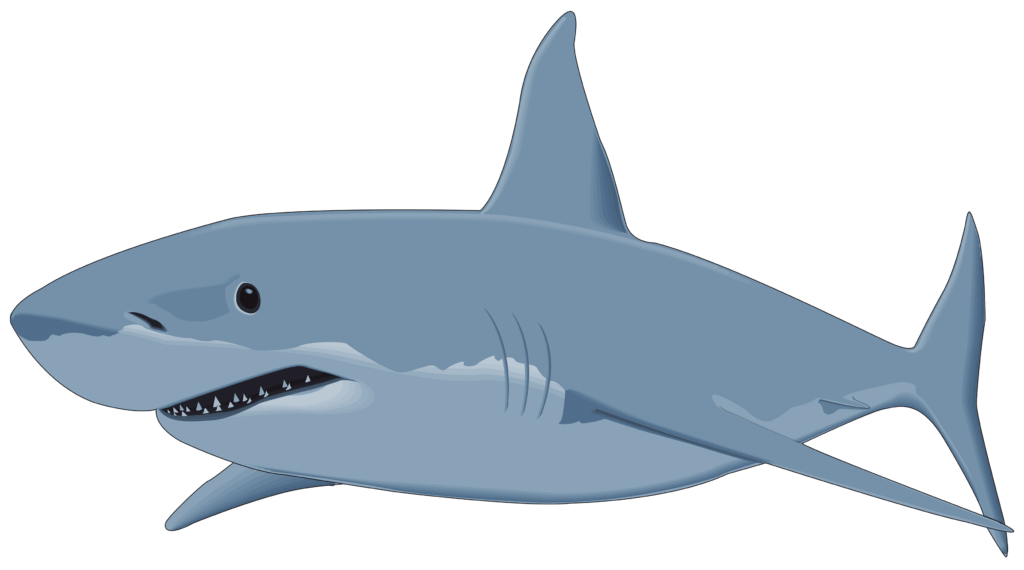
#36: How do I avoid awkward tan or sunburn patterns from my PFD or clothing?
Wearing a PFD or specific clothing for sun protection can result in uneven tans or burns. Asking about sunscreen application techniques and the best types of clothing that offer protection while minimizing odd tan lines is helpful.
| Here are some great accessories to prevent this: The 23 Best Paddleboard Accessories That You Need In 2024 |
#37: What should I do if I feel anxious or panicky in the middle of the water?
Feeling anxious or panicky when away from shore is a concern for those with anxiety or phobias related to water. Discussing strategies for calming anxiety, such as focused breathing, resting on the board, and signals to use if you need assistance, can be crucial.
#38: Is it rude to ask someone to stop splashing or making waves near me?
For beginners, unexpected splashes or waves can be unsettling. Understanding how to politely communicate your comfort levels to others nearby, and knowing most paddlers are considerate and willing to accommodate, can ease this concern.
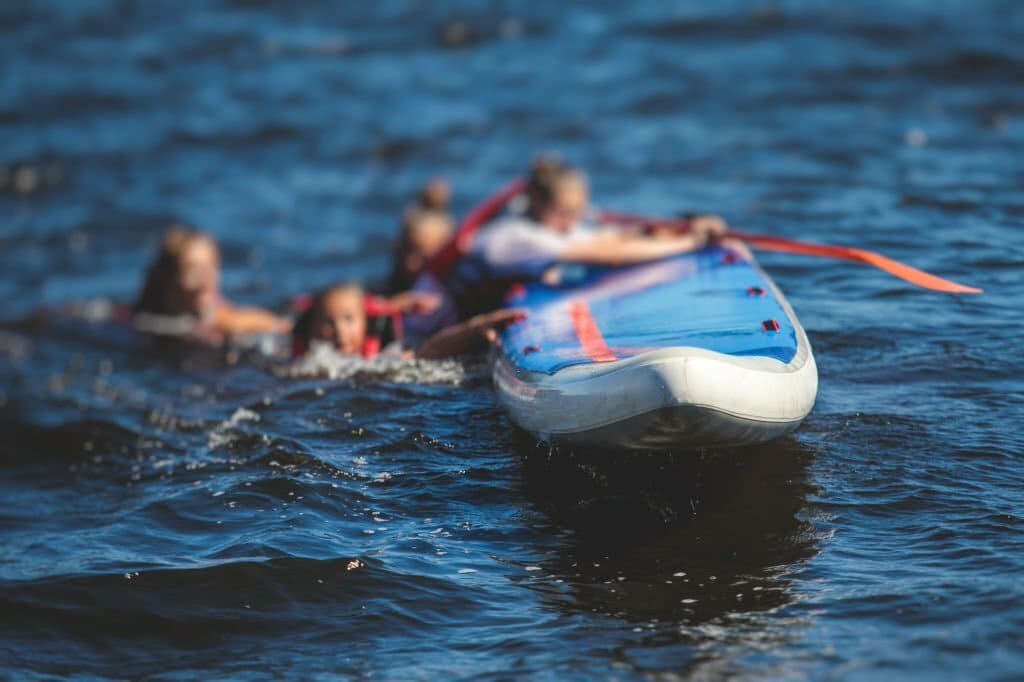
#39: What if I get an awkward itch or need to adjust my swimsuit in a revealing way while on the board?
Dealing with personal discomfort or needing to adjust clothing in potentially revealing ways can be embarrassing. Knowing how to discreetly handle such situations, perhaps by turning away from the group or using the water to mask your actions, can help maintain privacy and comfort.
#40: Is it common to feel embarrassed about using a beginner board when others have advanced equipment?
Feeling self-conscious about the gear you’re using, especially if it’s clearly for beginners, is understandable. It’s helpful to remember that every experienced paddler started somewhere, and the paddle boarding community tends to value inclusivity and personal progress over equipment status.
| These are the best paddle boarding brands in 2024: Best Paddleboard Brands: Our Top Recommendations For 2024 |
#41: How do I handle getting water in my ears that won’t come out, especially if it causes discomfort or affects my balance?
Water trapped in the ears is a common annoyance that can lead to discomfort or even infection. Asking about preventive measures, like wearing earplugs designed for water sports, and techniques for safely removing trapped water post-paddle, is important for comfort and health.

#42: Is it embarrassing to ask for help in front of others if I can’t get back on my paddle board after falling off
Needing assistance to climb back onto a paddle board, especially after multiple attempts, might feel demeaning in the presence of others. It’s beneficial to understand that seeking help is perfectly normal and part of the learning process. Most experienced paddlers and instructors are more than willing to offer assistance and tips, emphasizing the supportive nature of the paddle boarding community.
Paddle Board Questions – Conclusion:
Paddle boarding is an awesome way to get out on the water, offering both a peaceful escape and a solid workout. Whether you’re a total newbie or looking to improve your skills, it’s normal to have a bunch of questions, and honestly, there’s no such thing as a silly question.
The answers provided here aim to make you feel more at ease and ready to hop on a board and start paddling. Remember, every paddler started somewhere, and the paddle boarding community is all about sharing the stoke and helping each other out.
| Looking for insider guides to some amazing paddle boarding locations? Check the Paddleboard Insiders Location Guides |
